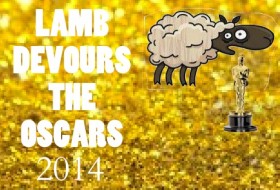Editor’s note: This is part of a 37-part series dissecting the 86th Academy Awards, brought to you by the Large Association of Movie Blogs and its assorted members. Nearly every day leading up to the Oscars, at least one new post written by a different LAMB will be published, each covering a different category of the Oscars. Also, every Best Picture and Best Director nominee gets its own post. To read the other posts regarding this event, please click here. Thank you, and enjoy!
ORIGINAL SCORE
BY LUCIEN OF BUZZHUB
Film scores are a true passion of mine. I rarely go one day without jamming to a bit of Zimmer on the bus or weeping along with some Michael Giacchino. This does, of course, make my interest in other genres of music quite limited and, arguable, nonexistent, a fact which provides its own social issues. Nevertheless, I jumped at the opportunity to cover this year’s crop of Original Score nominees, especially as I am editing LAMB Devours The Oscars this year, and have gotten the chance to read some superb articles on other Oscar categories and being inspired.
Before I give you my opinion of each of the five nominees, I would like to point out what I believe are a few major omissions. Hans Zimmer is, as I may have suggested earlier, one of my all-time favourite composers, and his work on Zack Snyder’s severely problematic Man of Steel was the best thing about the film by a mile- and undoubtedly the finest film score of 2013. Also of note (and deserving of recognition) were his accompaniments for The Lone Ranger and Rush, while the most Oscar-y of his 2013 scores with the pretty underwhelming four-note 12 Years A Slave score. Game of Thrones composer Ramin Djawadi’s Pacific Rim, Howard Shore’s Desolation of Smaug and Michael Giacchino’s mesmerising Star Trek Into Darkness music were also all film-defining works of brilliance.
Below you can ready my opinions on the five nominated scores, and you can listen to a track from each by clicking on the artwork!
 Gravity– my favourite film of 2013 by a wide margin- would be NOTHING without Steven Price‘s score. Considering only two actors appear on screen, with only one featuring for the majority of the running time, an engaging and moving accompaniment was required to make up for the lack of consistent dialogue. Steve Price, whose only previous ‘Composer’ credits have been The World’s End and Attack The Block, provided just what Alfonso Cuaron needed- something which captured perfectly the stress, fear and sense of isolation that Sandra Bullock’s Dr Ryan Stone experiences during her 82-minute space nightmare. From the opening, heart-stopping drone to the closing track- “Shenzou”- which encapsulates fully Ryan’s feeling of rebirth as she reenters Earth’s atmosphere, nobody deserves an Oscar more than Price.
Gravity– my favourite film of 2013 by a wide margin- would be NOTHING without Steven Price‘s score. Considering only two actors appear on screen, with only one featuring for the majority of the running time, an engaging and moving accompaniment was required to make up for the lack of consistent dialogue. Steve Price, whose only previous ‘Composer’ credits have been The World’s End and Attack The Block, provided just what Alfonso Cuaron needed- something which captured perfectly the stress, fear and sense of isolation that Sandra Bullock’s Dr Ryan Stone experiences during her 82-minute space nightmare. From the opening, heart-stopping drone to the closing track- “Shenzou”- which encapsulates fully Ryan’s feeling of rebirth as she reenters Earth’s atmosphere, nobody deserves an Oscar more than Price.
 Of all the fine composers on this list, Thomas Newman is probably the one whose work has moved me the most this century. The only problem is, whilst Finding Nemo and A Series of Unfortunate Events are two of the greatest film scores I have ever heard, he hasn’t exactly pulled anything very original out of his hat since they came out. The Adjustment Bureau, Revolutionary Road and The Help have all been improved greatly by Newman’s participation, but have all just reused many of Nemo‘s themes- beautiful as they may be. For Saving Mr. Banks, the seriously underrated and under-nominated Mary Poppins true-story, Newman has gone with two different themes- the Nemo-esque accompaniment to the inferior flashbacks to Poppins author PL Travers’ childhood, and a complete repeat of his The Newsroom theme for the Hollywood-set, Walt Disney-focused scenes.
Of all the fine composers on this list, Thomas Newman is probably the one whose work has moved me the most this century. The only problem is, whilst Finding Nemo and A Series of Unfortunate Events are two of the greatest film scores I have ever heard, he hasn’t exactly pulled anything very original out of his hat since they came out. The Adjustment Bureau, Revolutionary Road and The Help have all been improved greatly by Newman’s participation, but have all just reused many of Nemo‘s themes- beautiful as they may be. For Saving Mr. Banks, the seriously underrated and under-nominated Mary Poppins true-story, Newman has gone with two different themes- the Nemo-esque accompaniment to the inferior flashbacks to Poppins author PL Travers’ childhood, and a complete repeat of his The Newsroom theme for the Hollywood-set, Walt Disney-focused scenes.
 For his first non-Spielberg score since Memoirs of a Geisha, John Williams decided to dig out some of his best melodies from over the years and stick them together to form the accompaniment for the disappointing forgettable The Book Thief. There are parts of Schindler’s List and parts of Harry Potter and the Chamber of Secrets, especially in the film’s opening scenes. Does Williams deserve another Oscar for this? Not really. Will this score move any child of the 80s or 90s to tears? Almost undoubtedly!
For his first non-Spielberg score since Memoirs of a Geisha, John Williams decided to dig out some of his best melodies from over the years and stick them together to form the accompaniment for the disappointing forgettable The Book Thief. There are parts of Schindler’s List and parts of Harry Potter and the Chamber of Secrets, especially in the film’s opening scenes. Does Williams deserve another Oscar for this? Not really. Will this score move any child of the 80s or 90s to tears? Almost undoubtedly!
 I saw Arcade Fire live in Dublin in 2010, and it was a mesmerising musical experience. Playing dozens of their beautiful, melancholic alt-rock songs over three hours, it was an entrancing concert. Their most recent album, Reflektor, was seriously disappointing and lacking the originality and relatable themes of their previous work, and the soundtrack to Her isn’t much different. Sure, it’s atmospheric- and fits with the film’s tone of isolation and longing. However, Fire are capable of so much more. That said, the film’s Original Song nomination, The Moon Song, written by Karen O, is quite beautiful indeed.
I saw Arcade Fire live in Dublin in 2010, and it was a mesmerising musical experience. Playing dozens of their beautiful, melancholic alt-rock songs over three hours, it was an entrancing concert. Their most recent album, Reflektor, was seriously disappointing and lacking the originality and relatable themes of their previous work, and the soundtrack to Her isn’t much different. Sure, it’s atmospheric- and fits with the film’s tone of isolation and longing. However, Fire are capable of so much more. That said, the film’s Original Song nomination, The Moon Song, written by Karen O, is quite beautiful indeed.
 Whenever I listen to Alexander Desplat‘s music, I feel like i’ve just opened a music box and a little ceramic ballerina is spinning around inside. Either that, or i’m sobbing uncontrollably at Lily’s Theme or Statues from his work on the final Harry Potter film. The score for Philomena, Stephen Frears’ deeply moving but somewhat heartwarming comedy-drama starring Judi Dench as an Irish woman whose son was taken from her as a child, fits perfectly into the former category, with enjoyable piano notes used for the livelier moments, and low chords brought in for the darker scenes. It’s more of the same from Desplat, but that doesn’t mean it isn’t very good.
Whenever I listen to Alexander Desplat‘s music, I feel like i’ve just opened a music box and a little ceramic ballerina is spinning around inside. Either that, or i’m sobbing uncontrollably at Lily’s Theme or Statues from his work on the final Harry Potter film. The score for Philomena, Stephen Frears’ deeply moving but somewhat heartwarming comedy-drama starring Judi Dench as an Irish woman whose son was taken from her as a child, fits perfectly into the former category, with enjoyable piano notes used for the livelier moments, and low chords brought in for the darker scenes. It’s more of the same from Desplat, but that doesn’t mean it isn’t very good.
Overall, I feel Gravity will probably go home with this (deservedly), unless the academy decides to give Her or Philomena a token Oscar after ignoring them in all other categories.






I haft to agree with you on the score for Gravity. That ending theme is really quite astounding